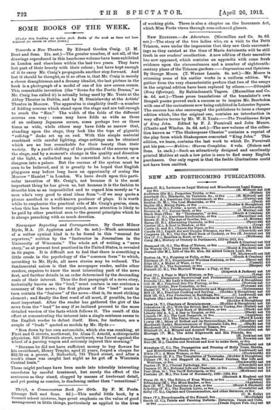Newspaper Reporting and Correspondence. By Grant Milner Hyde, M.A. (D.
Appleton and Co. 6s. net.)—Much amusement of a rather cynical kind is to be found in this "manual for reporters," written by the "Instructor in Journalism in the University of Wisconsin." The whole art of writing a "news story," as at present best practised in the United States, is revealed in its pages. It is difficult not to feel that there is something a little crude in the psychology of the "common form" to which, according to Mr. Hyde, all news stories may be reduced. The fundamental axiom is that the newspaper reader, unlike other readers, requires to know the most interesting part of the news first, and further details in an order determined by the descending scale of their interest. Thus the first paragraph of a news story, technically known as the "lead," must contain in one sentence a summary of the news; the first phrase of the "lead" must in turn contain the "feature" of the news—that is, its most striking element ; and finally the first word of all must, if possible, be the most important. After the reader has gathered the gist of the news from the "lead" he may if so inclined proceed to the more detailed version of the facts which follows it. The result of this effort at concentrating the interest into a single sentence seems to the English reader to defeat itself. Here, for instance, are a couple of "leads" quoted as models by Mr. Hyde :—
" Run down by her own automobile, which she was cranking, at First and G streets, northwest, Dr. Alma C. Arnold, a chiropractic phybician, 825 Fifteenth street, northwest, was forced against the wheel of a passing wagon and seriously injured this morning."
"Because he did not have sufficient money to buy flowers for his sweetheart, Henry Trupke, aged 21 years, forged a cheque for $22.50 on a grocer, J. Sieberlich, 781 Third street, and after a week's chase was caught last night as he got off a Wisconsin Central train."
These might perhaps have been made into tolerably interesting anecdotes by careful treatment, but surely the effect of the sentences as they stand, clogged by masses of irrelevant detail, and yet posing as concise, is deadening rather than "sensational."


























































 Previous page
Previous page